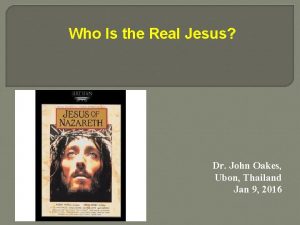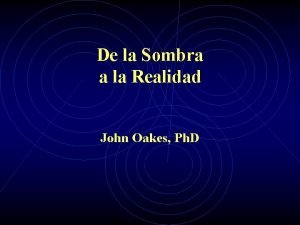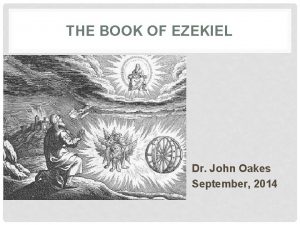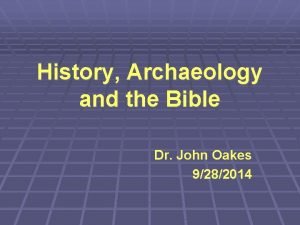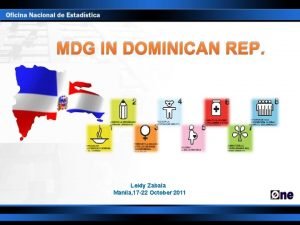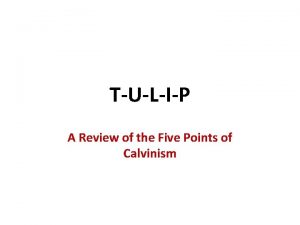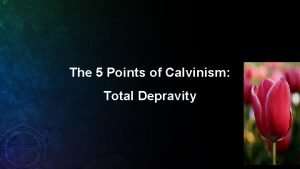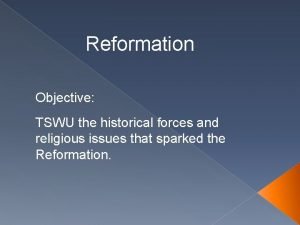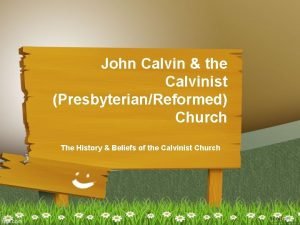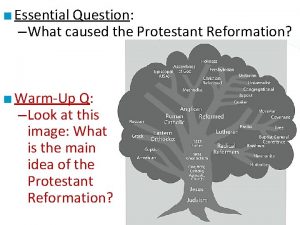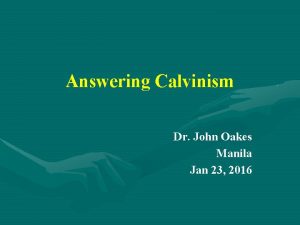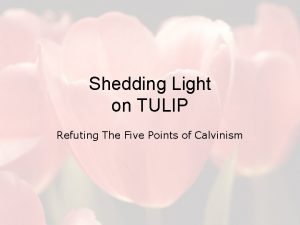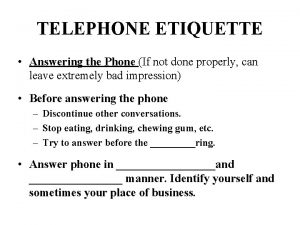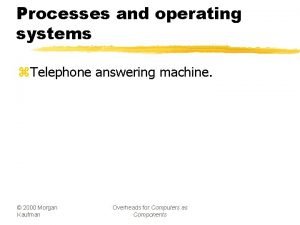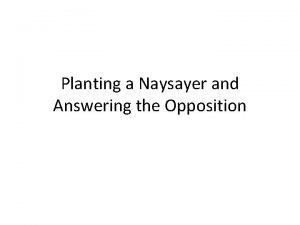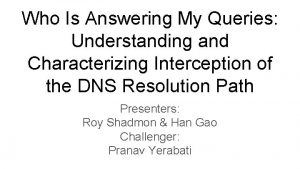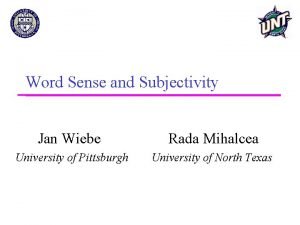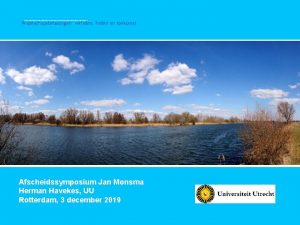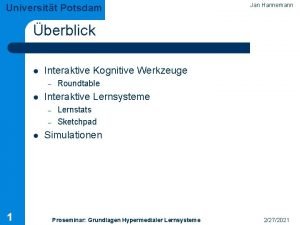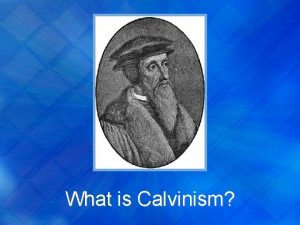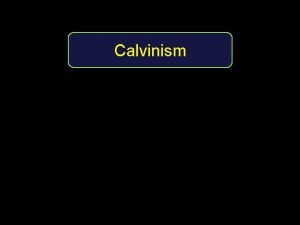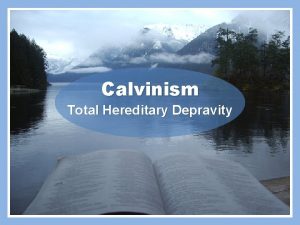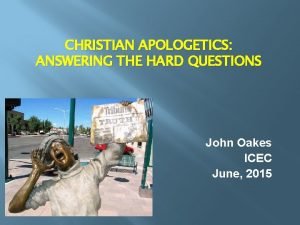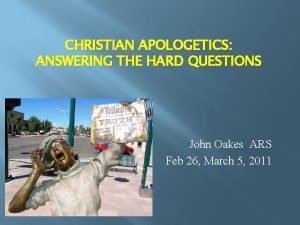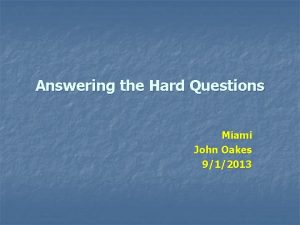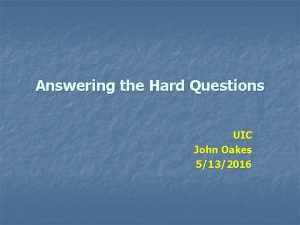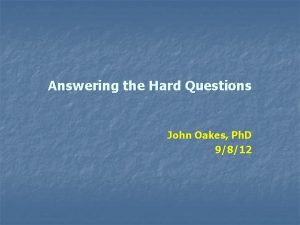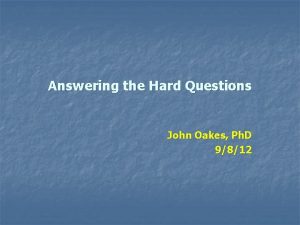Answering Calvinism Dr John Oakes Manila Jan 23










![Julian of Eclanum (c. 386 -c. 455) • “You [ie. Augustine] think that your Julian of Eclanum (c. 386 -c. 455) • “You [ie. Augustine] think that your](https://slidetodoc.com/presentation_image/24dc5b6d10e37496d59e0360987cde98/image-11.jpg)
































































- Slides: 75

Answering Calvinism Dr. John Oakes Manila Jan 23, 2016

Discussion Questions Is predestination biblical? What scriptures would you use? Is God absolutely sovereign? Is God’s will always done? Are human beings born guilty of the sin of Adam (and Eve)? Is “the fall of man” a biblical concept? If so, what is the nature of that fall, and what are the implications for us as individuals? Is the idea of free will biblical? Scriptures?

What is Calvinism? Def: The “reformed” theological system most commonly associated with the reformer John Calvin. Better: The theological system based on the assumption of the absolute sovereignty of God and the concept of total depravity of mankind. Was John Calvin a Calvinist?

Outline I. The history of Calvinistic thinking. II. Implications on Christian theology, doctrine and practice. III. Biblical teaching on free will, the fall of man, predestination and perseverance. IV. Refuting Calvinism and Calvinist proof-texts.

But First… Total Depravity Def: When Adam (and Eve) rebelled and sinned, the result was the “fall” of mankind, which means that all subsequent humans arecompletely depraved. We genetically inherit the sin of Adam and are born in sin. As a result, we are absolutely powerless, not only to stop sinning but to decide to respond to God’s love, to obey him, to repent and put our faith in him.

I. The History of Calvinistic Thinking Where did all this originate? Augustine! Augustine of Hippo (354 -430) “The City of God” Thomas Aquinas (1225 -1274) Martin Luther (1483 -1546): an Augustinian monk. Ulrich Zwingli (1484 -1531) Reformed Churches. John Calvin (1509 -1564) “Institutes of the Christian Religion”

Augustine of Hippo (354 -430) The City of God: God’s Sovereignty Total depravity Monergism (only God) Double Predestination? Original Sin Infant baptism required for salvation Former Manichaean (dualism) Confessions Opposed Pelagius Augustine of Hippo (from 6 th century)

Augustine on Free Will “Tiny babies are not weighed down by their own sin, but they are being burdened with the sin of another. ” “A man’s free will avails for nothing except to sin. ” "It is, therefore, in the power of the wicked to sin; but that in sinning they should do this or that by that wickedness is not in their power, but in God's, who divides the darkness and regulates it; so that hence even what they do contrary to God's will is not fulfilled except it be God's will. “ “Men’s evil wills are prepared by God and predestination. God, in his timeless wisdom had decided to prepare only the will of a few. ” Calvinism is, in essence Augistinism.

Pelagius AD c. 354 -430 Works Salvation? Affirmed the existence of free will. “Evil is not born with us, and we are procreated without fault. ” Rejected infant baptism. Taught that we become holy through our own effort. “Since perfection is possible for man, it is obligatory. ” We did not sin in Adam. We sinned like Adam.

Augustine’s Response to Pelagius 1. Death came from sin, not man's physical nature. 2. Infants must be baptized to be cleansed from original sin. 3. No good works can come without God's grace. 4. Children dying without baptism are excluded from both the Kingdom of heaven and eternal life. Conclusion: We should be cautious against
![Julian of Eclanum c 386 c 455 You ie Augustine think that your Julian of Eclanum (c. 386 -c. 455) • “You [ie. Augustine] think that your](https://slidetodoc.com/presentation_image/24dc5b6d10e37496d59e0360987cde98/image-11.jpg)
Julian of Eclanum (c. 386 -c. 455) • “You [ie. Augustine] think that your Lord is capable of committing a crime against justice such as is hardly conceivable even among the barbarians. ” • Accused Augustine of Manicheism and of making God the creator of both good and evil. “We maintain that men are the work of God, and that no one is forced unwillingly by His power either into evil or good, but that man does either good or ill of his own will; but that in a good work he is always assisted by God’s grace, while in evil he is incited by the suggestions of the devil. ”

Thomas Aquinas 1225 -1274 Disciple of Aristotle Scholasticism Arguments for existence of God Synergism?

Thomas Aquinas: “God, therefore, is the first cause, who moves causes both natural and voluntary. And just as by moving natural causes He does not prevent their actions from being natural, so by moving voluntary causes He does not deprive their actions of being voluntary; but rather is He the cause of this very thing in them, for He operates in each thing according to his own nature. ” In other words, Aquinas believed in free will and not a strict monergism.

Martin Luther 1483 -1541 Augustinian Monk Faith Alone Grace Alone Scripture Alone Predestination

Martin Luther: “Away with James… His authority is not great enough to cause me to abandon the doctrine of faith [alone] and to deviate from the authority of the other apostles and the entire Scripture. ” St. James’ epistle is really an epistle of straw, compared to these others [Romans, Galatians, Ephesians, Colossians] for it has nothing of the nature of the gospel about it. ” Also questioned canonicity of Hebrews because of its teaching on perseverence of the saints.

Luther and Free Will “Free will is an empty term whose reality is lost and a lost liberty is not liberty at all” “Free will is really a fiction… everything takes place by absolute necessity. ” Luther, Assertio, 36

Luther and Double Predestination "All things whatever arise from, and depend on, the divine appointment; whereby it was foreordained who should receive the word of life, and who should disbelieve it; who should be delivered from their sins, and who should be hardened in them; and who should be justified and who should be condemned. " Melanchthon and the Lutheran Concord taught single predestination. Luther left it as a mystery.

Ulrich Zwingli 1484 -1531 Opposed baptismal regeneration Double Predestination Reformed Theology “Those individuals who end up damned forever in hell are also eternally determined by God for that fate. ”

John Calvin 1509 -1564 Institutes of Christian Religion His emphasis: the sovereignty of God TULIP

Calvin on Predestination We call predestination God’s eternal decree, by which he determined with himself what he willed to become of each man. For all are not created in equal condition; rather, eternal life is foreordained for some, eternal damnation for others. Therefore, as any man has been created to one or the other of these ends, we speak of him as predestined to life or death. ” Uses Eph 1: 4, John 17: 6 and 6: 37 and Romans 9

Calvin on Total Depravity (Institutes 1. 15. 4) “Even though we grant that God’s image was not totally annihilated and destroyed in him [Adam], yet it was so corrupted that whatever remains is frightful deformity. ” “What remains in men? They are only vermin and rottenness”

Theodore Beza (1519 -1605) Successor to Calvin in Geneva Created what now called Calvinism TULIP Supralapsarianism (as opposed to infralapsarianism)

TULIP • • • Total depravity Unconditional election Limited atonement Irresistable grace Perseverence of the saint (once saved, always saved) • This entire system is: – Logical and – Built on the doctrine of Original Sin/Total Depravity.

Jacob Arminius (15601609) Student of Beza Opposed Reformed idea of predestination. Synergism: God works together with our free will to bring about salvation Are we Arminians?

Arminius and “Prevenient Grace” Arminius: "the grace sufficient for salvation is conferred on the Elect, and on the Non-elect; that, if they will, they may believe or not believe, may be saved or not be saved. “ A human being cannot, on his or her own, turn to God grants all sinners prevenient grace (prevenient meaning "coming before"). With this prevenient grace (or with its effects on the fallen human), a person is able to freely choose to place faith in Christ or reject his salvation. If the person accepts it, then God justifies him and continues to give further grace to spiritually heal and sanctify him.

English and American Puritanism Jonathan Edwards 1703 -1758 “A Sinner in the Hands of an Angry God. ” How do we know we are of the elect?

John Wesley (1703 -1791) and Methodism "The will of man is by nature free only to evil. Yet. . . every man has a measure of free-will restored to him by grace. " "Natural free-will in the present state of mankind, I do not understand: I only assert, that there is a measure of freewill supernaturally restored to every man, together with that supernatural light which 'enlightens every man that comes into the world. '”

1800’s America: Happy Calvinism Once Saved, Always Saved • Revivalism on the Frontier • Barton Stone rejects Calvinism • Mourner’s Bench Charles Finney 1835 • Once God saves you, in is impossible to lose your salvation, no matter what. • Billy Sunday Early 1900 s “The Sawdust Trail”

Evangelicalism: Soft Calvinism 1950 s Billy Graham Bill Bright Four Spiritual Laws Sinner’s Prayer "Lord Jesus, I need You. Thank You for dying on the cross for my sins. I open the door of my life and receive You as my Savior and Lord. Thank You forgiving my sins and giving me eternal life. Take control of the throne of my life. Make me the kind of person You want me to be. "

II. Implications of Calvinism a. Rejection of baptismal regeneration. b. Lack of motivation toward repentance and effort toward righteousness. c. Strange ideas about creation. d. Once saved, always saved. e. Lack of intrinsic motivation for evangelism f. Arrogance toward the lost. g. Intellectualism. h. Lack of assurance of salvation.

III. Biblical teaching on free will, the fall of man, predestination and perseverance. • Q: Scriptures which appear to support the doctrine of predestination? • Q: Is a believer in this false doctrine lost? • Q: Scriptures which prove free will and refute predestination? • Q: Where do we go first to learn what happened at the Fall?

The Fall of Mankind Genesis 3: 1 -13 Adam and Eve give in to temptation and eat the fruit. What were the immediate consequences? Gen 3: 21 -14 1. They lost their innocence. 2. They “became like one of us, knowing good and evil. They gained a propensity toward sin—a “sinful nature. ” 3. They lost access to the tree of life. Did they lose physical immortality or did they die spiritually or both? But… They did NOT become totally depraved.

Did Adam and Eve, and did we lose our free will in the Fall? • They (and we) still had “free will”!!! It is God’s sovereign will that we have free will because he loves us. Love gives a choice. By definition, it is impossible to make someone love someone else. If the decision to love is not free then it is not love. Deut 30: 19 -20 Joshua 24: 15 Ezekiel 18: 19 -20

Before Romans 5 and 8 -10, Q: Is God’s Will Always Done? • Matthew 6: 10. Your will be done…. • Matthew 23: 37. . but you were not willing. • Ezek 18: 31 -32 I take no pleasure in the death

Is Faith Alone Biblical? James 2: 14 -26 Galatians 5: 6 Faith expressing itself in love John 6: 29 The works God requires? To believe in him.

Is Baptism a Work for Salvation? Baptism is passive. It is done to us. Coll 2: 12 -13 If baptism is a “work” it is a work of God, not of us.

Romans 5: 12 -19 Adam and Jesus are both very similar and very different. Romans 5: 12, 17, 18 The central question: What was the effect of Adam’s sin? Does this passage support “Original Sin”? Zwingli: “In Adam’s fall, we sinned all. ”

The Effect of Adam’s Sin a. Sin entered the world. b. Death came to all (physical or spiritual or both? ) c. All sinned We are not guilty of Adam’s sin, but because of what he did, all of us will sin. We have “fallen. ” 5: 13 Sin is not taken into account when there is no law… Romans 5: 20, Romans 7: 13 Q: Do you see sin as utterly sinful?

Romans 5: 15 -19 Adam and Jesus 5: 15 The gift is not (exactly) like the tresspass. The gift: Jesus The tresspass: Adam similar but different. One act let to many sins vs. The many sins led to one act. The gift followed many sins, while the condemnation followed one sin. v. 18 -19 condemnation for all and life for all….

The Second Adam in 1 Cor 15: 20 -23 This is about the physical resurrection, to he is discussing the physical results of Adam’s sin. NOT the same subject as Romans 5. 1 Cor 15: 45 -49 A difficult passage, but the same topic. Again, talking about physical things and the resurrection.

Romans 8: 28 -39 God’s provision for us Romans 8: 28 Q: Is God’s will always done? Even the things that are NOT according to his will he can use for our benefit. Romans 8: 29 Does foreknowledge = predestination? Paraphrase: Those who God, in his foreknowledge, knew would be saved by the blood of Jesus, he predestined the possibility of that salvation.

TULIP Does Romans 8: 29 -30 give support for Calvinism/TULIP? T Total depravity U Unconditional Election L Limited Atonement I Irresistible Grace P Perseverance of the Saints (once saved, always saved) In a word: No! 1 Tim 2: 4, Deut 30: 19 -20, 2 Cor 5: 15

Romans 8: 30 Paraphrase of Romans 8: 30 (in a sense) all are predestined, but not all those who are predestined are called (hear the message), and not all those who are called are justified (saved) , and not all those who are justified are glorified (make it to heaven). But… For those whom God foreknows, all of these are true of all of them. Who is predestined, called, justified and glorified? Calvin and Zwingli: a tiny minority who God chooses. All others were created in order to go to hell. Paul: Those God foreknew would be saved.

Romans 8: 30 Paraphrase of Romans 8: 30 (in a sense) all are predestined, but not all those who are predestined are called (hear the message), and not all those who are called are justified (saved) , and not all those who are justified are glorified (make it to heaven). But… For those whom God foreknows, all of these are true of all of them. Who is predestined, called, justified and glorified? Calvin and Zwingli: a tiny minority who God chooses. All others were created in order to go to hell. Paul: Those God foreknew would be saved.

Romans 8: 31 -39 Security in Christ Does this passage support “once saved, always saved”? (also John 10: 27 -29) Answer: No! Nothing ourside ourselves can separate us, and nothing can snatch us out of Jesus’ hand, but we can walk away. The point: We can and should feel very confident in Christ. Q: Do you feel this way?

Romans Ch 9 -11 God rejects Israel and chooses the Gentiles Romans 9: 1 -5 Paul is getting really emotional here. Why? Because he REALLY loves the Jews, but he is about to deliver some news they do not want to hear. God has rejected (physical) Israel and has chosen the Gentiles. The context: There are some Jewish Christians who are jealous and upset with God (and maybe with Paul) that he is allowing Gentiles into the kingdom so easily.

Romans 9: 6 -9 Not all Israel is Israel Romans 9: 6 Not all Israel are Israel (in two senses) Romans 9: 7 “It is through Isaac that your offspring will be reckoned” (Gal 4: 21 -31) 9: 8 In other words, the children of promise, who walk by faith (not physical children) will be reconciled. Q: What should we rely on? The promise.

Romans 9: 10 -16 God’s Predestination Q: What is God’s predestination like? TULIP? 9: 12 -14 The older will serve the younger (Genesis 25: 19 -26) Jacob have I lived, Esau I hated (Malachi 1: 2 -3 I will have mercy on whom I will have mercy (Exodus 33: 19) In all three cases, God chose Israel. Did they complain when that happened? Answer: It is about God trying to bless his people.

Romans 9: 17 -29 More examples of God’s Predestination Romans 9: 17 Did God predestine that Pharaoh would go to hell? What about Judas? The purpose in both cases: to free God’s people from slavery, physical and spiritual. 9: 19 Jews: Fine. If so, then I am not responsible for my own sin. 9: 20 Who are you, O man, to talk back to God. 9: 22 God: If I use the stubbornness of the Jews in order to help the Gentiles be saved, you should be happy about that!

The Potter and the Clay Romans 8: 21 I am the potter. Other potter/clay examples: Jeremiah 18: 1 -10 God chooses Moses, Isaac, Jacob, David, Solomon, Jeremiah, Isaiah, Daniel and Jonah. All chosen for “special duty. ”

Summary: God’s Predestination God is sovereign and his will can trump our will, but: 1. He only intervenes in order to predestine salvation for his people, “first for the Jews, then for the Gentiles. ” 2. Even when he “jerks people around” God never steals their ability to choose whether, ultimately, to serve God and to be saved.

Hebrews and Falling Away/Perseverance • They shall never enter my rest 3: 11, 4: 5 • We have come to share in Christ if we hold firmly to the end the confidence we had at first. 3: 14 • They were not able to enter because of their unbelief 3: 19 • Be careful not to be found to have fallen short of it. 4: 1 • Some… did not go in because of their obedience 4: 6 • Let us make every effort to enter that rest so that no one will fall by following their example of disobedience 4: 11 • Do you get the point?

Historical type/antitype in the Exodus OLD TESTAMENT TYPE NEW TESTAMENT ANTITYPE SLAVERY IN EGYPT LOST, SLAVE TO SIN WANDERING IN THE WILDERNESS SAVED, BUT LIVING THE LIFE OF A DISCIPLE ENTERING THE PROMISED LAND ENTERING HEAVEN

Hebrews 6: 4 -6 Who is he talking to? • a. been enlightened (NT church “enlightened” = baptized) • b. tasted the heavenly gift (salvation? ) • c. shared in the Holy Spirit • d. tasted the goodness of the word • e. tasted the coming age (saved) • Yes, you can fall away! Conclusion: You had better move on toward maturity in Christ.

Hebrews 6: 4 -8 • It is impossible… if they fall away, to be brought back to repentance. • They are crucifying the Son of God all over again. • Land that produces thorns… will be burned.

Falling Away Hebrews 10: 26 -31 • • • Crucifying the Son of God all over again. Subjecting Jesus to public disgrace Trampling the Son of God under foot. (Heb 10: 29) Insulted the Holy Spirit (Heb 10: 29) Blasphemed (spoken against) the Holy Spirit (Matt 12: 32) • Committed the unforgivable sin (1 John 5: 16 ) • What is the “unforgivable sin? ” To willfully, deliberately continue in sin. (Hebrews 10: 26)

God’s Assurance: Hebrews 6: 9 -20 Two unchangeable things: God’s Word God’s Oath (Genesis 22: 16 -18) Jesus, your anchor, is behind the veil with the Father

God’s Assurance: Hebrews 10: 19 -23 We have confidence to enter the Most Holy Place Let us draw near to God… in full assurance of faith. For he who promised is faithful. Hebrews 10: 35 -36 Do not throw away your confidence; it will be richly rewarded…. You will receive what he has promised.

More Passages on Perseverance James 5: 19 -20 Whoever turns a sinner… will save him from death and cover a multitude of sins. Phil 2: 12 Work out your salvation with fear and trembling. Romans 11: 19 -22 (to Gentile Christians) provided that you continue in his kindness. Matthew 25: 1 -13 Parable of the Virgins Matthew 24: 13 …but he who stands firm to the end will be saved. Also: 1 Pet 4: 17 -18 2 Cor 5: 10 Romans 2: 5 -

IV. Questions for Calvinists and Calvinist proof-texts.

Questions for Calvinists #1 Question: What is the difference between election and salvation in this case? If election has nothing to do with our faith, then what is the role of faith in salvation? Article XIV of the Canons of Dort (1619) “Faith is therefore to be considered as a gift of God, not on account of its being offered by God to man, to be accepted or rejected at his pleasure, but because it is in reality conferred, breathed and infused into him; … he… produces both the will to believe and the act of believing also.

Saved by faith or by election? A modern Calvinist, Boettner says: “A man is not saved because he believes in Christ; he believed in Christ because he is saved. ” What about Acts 16: 31, John 6: 28 -29, Romans 10: 910 Calvinists: If we are saved by us believing, then we are saving ourselves and grace is meaningless! Illustration: A man in a burning building….

Question #2 for a Calvinist Q: Why do we exist and why did God put the tree in the garden? Genesis 2 We exist because God wanted to love us, for us to love him and to love one another. Love gives a choice. That is why the tree was in the garden.

Question #3 For a Calvinist Q: Why are the lost not saved? Because they sinned? Calvinist: No! Because they were not elected by God. This means God does not want us to be saved. Then what about 1 Tim 2: 3 -4. Does this mean God’s will is not done?

Question # 4 For a Calvinist Q: Why do we love God? Answer: Because he decided we would love him. Then what about 1 John 4: 19 We love him because he first loved us. God took a great risk when he created us, but in Calvinism God takes no risks.

Question #5 For a Calvinist Were Adam and Eve free to choose to eat from the tree or not to eat from the tree? If so, then were they literally the only humans who have ever had a choice?

Question #6 For a Calvinist (Given total depravity) Q: What about little babies who die? (If you believe in infant baptism, then what if the infant is not baptized? ) a. Trained Calvinists: Elect babies are saved, unelect babies go to hell. b. Unelected babies never die before old enough to be accountable. Only elect babies die. Westminister Confession “Elect infants dying in infancy are regenerated and saved by Christ, through the Spirit, who works when and where and how he

Question #7 For a Calvinist If limited atonement is true, then how do you explain these passages: 1 John 2: 2 He is the atoning sacrifice… for the sins of the whole world. Luke 2: 10 Good news… that will be for all the people. 2 Cor 5: 14 For we are convinced that one died for all. John 12: 32 When I am lifted up, I will draw all men to myself. Titus 2: 11 For the grace of God which brings salvation has appeared to all men. 1 Tim 2: 3 -6 God desires all men to be saved…. 2 Pet 3: 9 not wanting any to perish, but everyone to repent

Last Question for a Calvinist If God is love (1 John 4: 16) and God is just (2 Thess 1: 6), and everything God has made is very good (Genesis 1: 31). How, then, do you explain that God can be good, loving and just, yet predestine the vast majority of humans to be unrepentant sinners and to go to hell? How can God be the author and cause of evil?

Answering Calvinist Proof-Texts for Total Depravity Calvinist Proof-text #1 Exodus 20: 4 This is about temporal/physical consequences. Ezekiel 18 The soul who sins is the one who will die. We cannot use Ezekiel 18 to disprove Exodus 20: 4 or vice versa. We should ask, how can they both be true?

Calvinist Proof-text #2 Psalm 51: 5 Surely I was sinful at birth…. Answer: This is poetry, not a doctrinal statement. David is using hyperbole. Is Psalm 51: 4 literally true? Psalm 58: 3 is similar.

Calvinist Proof-text #3 Romans 3: 9 -12 None are righteous. None seek God. True, but we must observe the whole balance of scripture. Paul does not expect us to take this in its most literal possible sense. Matthew 13: 17 Many prophets and righteous men longed to see… Psalm 63: 1 [David says] “O God, you are my God. Earnestly I seek you. 2 Chron 34: 3 He began to seek the God of his father David. Parallel: Ecclesiastes 7: 20

Calvinism Proof-text(s) #4 Acts 13: 48, 1 Pet 2: 8 Arguably, the best “proof-texts” for total depravity and unconditonal election. Acts 13: 48 All who were appointed to eternal life believed. 1 Pet 2: 8 They stumble… because this is what they were destined for. These are two sides of a coin—Acts 13: 8 is about the saved and 1 Pet 2: 8 is about the lost. Are these passages about a general rather than a specific election? Debatable. Which means that these passages are debatable.

Calvinist Proof-text #5 1 Cor 2: 14 The man without the Spirit cannot understand God. True, but Paul is addressing the Corinthians (1 Cor 1: 2) and to the extent we are unspiritual, it is true of us, even as saved people. We are saved, already, but not yet. We are spiritual, already, but not yet. This passage is addressing relative depravity, not total depravity, and to that extent it applies both to the lost and to the saved.

Summary Calvinism is a theological system which was invented by Augustine, not by John Calvin. It came not from scripture, but either from his inherent dualism/Manichaeism or as a means to explain infant baptism or both. In any case, although the system is logical—indeed perhaps more “logical” than the truth—it is based on circular reasoning and on patently false assumptions about God. It is based on the assumption that if God gives us the choice of whether to accept his free gift or not, then this makes null and void his sovereignty. It is to be strongly rejected on multiple grounds. First, because it makes God the author of evil. Second, because it makes both the “love” of God for us and of us for Him to not be genuine love. Third, because it gives a theological basis for the twin false doctrines of praying Jesus into our hearts for salvation and once-saved-always-saved. The salvation of many millions of souls is at stake here. We cannot let this false theology remain unchallenged and we must inoculate the believers in our churches against this pernicious theological system.
 Jesus real
Jesus real John oakes
John oakes John oakes books
John oakes books John oakes phd
John oakes phd John oaks
John oaks The history and archaeology of the bible
The history and archaeology of the bible Janna oakes
Janna oakes Dr simon oakes
Dr simon oakes Simon oakes geography
Simon oakes geography Debbie oakes
Debbie oakes Grabb oakes measurement
Grabb oakes measurement Fr maximo villanueva
Fr maximo villanueva Manila to dominican republic
Manila to dominican republic Sifat jas hujan
Sifat jas hujan Metro manila christian church
Metro manila christian church Thrilla in manila
Thrilla in manila [email protected]
[email protected] Abpa
Abpa 5 points of calvinism
5 points of calvinism Lutheranism and calvinism
Lutheranism and calvinism Holy roman empire 1517
Holy roman empire 1517 5 points of calvinism
5 points of calvinism Puritanism vs calvinism
Puritanism vs calvinism 5 tenets of calvinism
5 tenets of calvinism Lutheranism beliefs
Lutheranism beliefs Calvinist beliefs
Calvinist beliefs Lutheranism calvinism and anglicanism chart
Lutheranism calvinism and anglicanism chart Irresistible grace calvinism
Irresistible grace calvinism Calvinist proof texts
Calvinist proof texts Separatists vs non separatists
Separatists vs non separatists Calvinism was the first protestant faith
Calvinism was the first protestant faith Tulip refuted
Tulip refuted Calvinism vs lutheranism chart
Calvinism vs lutheranism chart Procedures before telephoning
Procedures before telephoning Phone answering etiquette
Phone answering etiquette Sas answering service
Sas answering service Answering
Answering Examples of naysayers
Examples of naysayers Answering the opposition example
Answering the opposition example Answering
Answering Present continuous sentence hindi to english
Present continuous sentence hindi to english Open source question answering system
Open source question answering system Economics chapter 3 section 1 answer key
Economics chapter 3 section 1 answer key Asking questions in spanish
Asking questions in spanish Answering my queries
Answering my queries When answering a multiple choice question milady
When answering a multiple choice question milady Chapter 2 section 1 answering the three economic questions
Chapter 2 section 1 answering the three economic questions Answering machine
Answering machine Answering tag questions
Answering tag questions Chapter 2 section 1 answering the three economic questions
Chapter 2 section 1 answering the three economic questions Panicking spelling
Panicking spelling Answering the three economic questions
Answering the three economic questions Jan wiebe
Jan wiebe Rębajło pan tadeusz
Rębajło pan tadeusz Nuborgh college lambert franckens
Nuborgh college lambert franckens Jan monsma
Jan monsma Jan eberly ffa facts
Jan eberly ffa facts Jan neruda prezentace
Jan neruda prezentace Bankat dhe llojet e tyre
Bankat dhe llojet e tyre Robbert jan boswijk
Robbert jan boswijk Jan clevers
Jan clevers Jan ketelhut
Jan ketelhut Jan hannemann
Jan hannemann Jan erben
Jan erben Tren xiii
Tren xiii The next step in guided reading
The next step in guided reading Jan marek memorial
Jan marek memorial Faktormodell
Faktormodell Jan plasberg
Jan plasberg Jan weinberg
Jan weinberg Qka jane indet
Qka jane indet Jan stockel
Jan stockel Biskup jan ozga
Biskup jan ozga Jan sebastian bach prezentacja
Jan sebastian bach prezentacja Adam rayman
Adam rayman Jan nonneman
Jan nonneman
